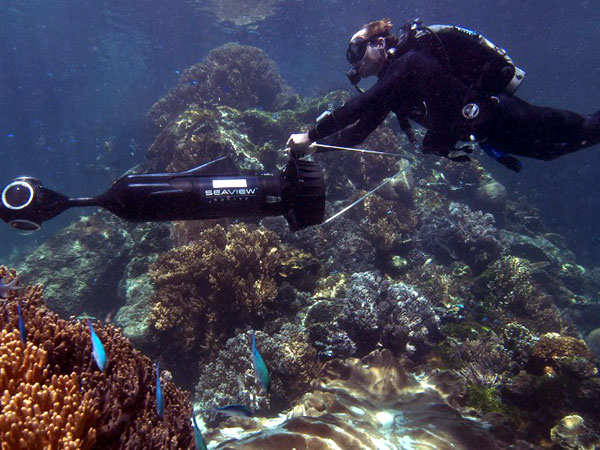One-third of Barrier Reef corals are dead or dying — scientists

An undated handout photo released on March 1, 2012, by the Catlin Seaview Survey shows Australian scientists mapping the iconic Great Barrier Reef with a custom-built underwater camera. Scientists said on May 30, 2016, that about 35 percent of the 2,300-kilometer long reef are dead or dying due to mass bleaching. AFP PHOTO
SYDNEY, Australia — At least 35 percent of corals in the northern and central regions of Australia’s Great Barrier Reef are dead or dying from a mass bleaching event, scientists said Monday.
The assessment was made following months of aerial and underwater surveys after the worst bleaching in recorded history first became evident in March as sea temperatures warm.
Terry Hughes, director of the ARC Centre of Excellence for Coral Reef Studies at the James Cook University, said global warming was playing havoc with the World Heritage-listed site.
“We found on average, that 35 percent of the corals are now dead or dying on 84 reefs that we surveyed along the northern and central sections of the Great Barrier Reef, between Townsville and Papua New Guinea,” he said in a statement.
“This is the third time in 18 years that the Great Barrier Reef has experienced mass bleaching due to global warming, and the current event is much more extreme than we’ve measured before.”
At least a decade was needed for the recovery of coral cover, “but it will take much longer to regain the largest and oldest corals that have died”, the joint statement from three leading universities said.
The reef is already under pressure from farming run-off, development, the coral-eating crown-of-thorns starfish, along with climate change.
Researchers from James Cook said in April that 93 percent of the 2,300-kilometer (1,429-mile) long site — the world’s biggest coral ecosystem — had been affected by the mass bleaching event.
Bleaching occurs when abnormal environmental conditions, such as warmer sea temperatures, cause corals to expel tiny photosynthetic algae, draining them of their color.
The impact was less severe in the southern parts of the reef as water temperatures were “closer to the normal (southern hemisphere) summer conditions”.
Although fewer corals have died in the south, the stress from bleaching is likely to temporarily slow down their reproduction and growth rates, the scientists added.
The phenomenon has also damaged corals off Australia’s west coast, with “extensive and patchy” bleaching and mortality.
“On the Kimberley coast where I work, up to 80 percent of the corals are severely bleached, and at least 15 percent have died already,” the University of Western Australia’s Verena Schoepf said.
The government this month insisted it was doing “more than ever before” to protect the Barrier Reef.
Last week it emerged that the environment department pressured the UN to remove all references to Australia from a report on climate change and its impact of World Heritage sites, including the Barrier Reef.
It claimed negative commentary impacted tourism, sparking outrage from activists who accused Canberra of “trying to pull wool over Australians’ eyes about serious threats to the future of our greatest natural wonder”.














